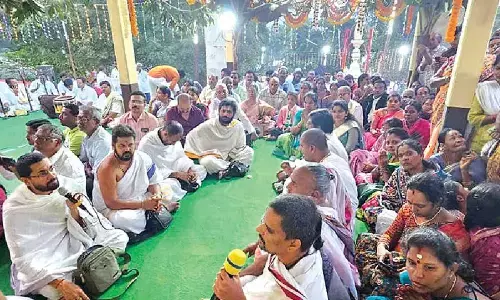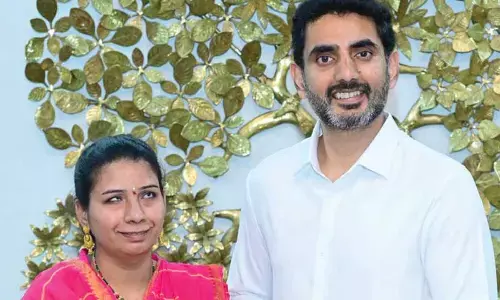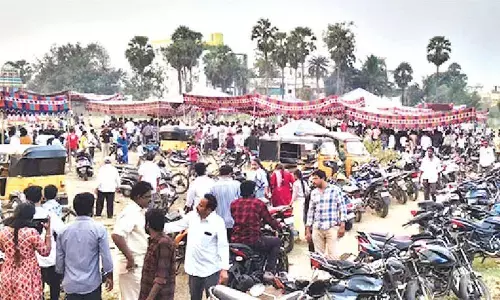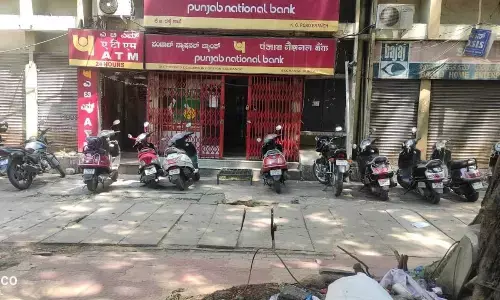My association with Malathi Chandur

My association with Malathi Chandur started in the 1950s when I was a college student. I was a voracious reader of books in general and novels in particular. I happened to read Malathi Chandur’s novel “Champakam-Cheda Purugulu” (Champakam and White Ants). This novel had a deep impact on me.
When Potti Sreeramulu sacrificed his life for the sake of a Telugu-speaking State, Malathi Chandur said through her protagonist in this novel that she had great respect for Potti Sreeramulu but she could not approve the creation of linguistic State because it was likely to create many divisions among people of India
.jpg) My association with Malathi Chandur started in the 1950s when I was a college student. I was a voracious reader of books in general and novels in particular. I happened to read Malathi Chandur’s novel “Champakam-Cheda Purugulu” (Champakam and White Ants). This novel had a deep impact on me.
My association with Malathi Chandur started in the 1950s when I was a college student. I was a voracious reader of books in general and novels in particular. I happened to read Malathi Chandur’s novel “Champakam-Cheda Purugulu” (Champakam and White Ants). This novel had a deep impact on me.
The theme, the direction, the characterization, the dialogues, the psychological probing of the characters, the overall construction of the novel: all these things which are the basic ingredients of a good novel were there in it. Champakam, the heroine, is a good-natured girl. She becomes a cine artist and earns sufficient money to feed members of her family. Members of her family like her mother, sisters, brothers-in-law live a luxurious life depending on the earnings of Champakam. When Champakam falls in love with a young man and wants to marry him, they create hurdles. If Champakam's marriage takes place, and she sets up her own family, the members of her family will be deprived of all the money being earned by her.
The conspiracy that Champakam’s family members hatch shocks readers. Being very innocent and soft-natured, Champakam commits suicide as she becomes terribly frustrated with her own selfish and evil-minded family members.
I was so impressed by this novel that a character in my story ‘Atholokam’ remembers Champakam, the protagonist in the novel and abhors the cruelty shown by her own so-called relatives. If these are the ways of our society, how can a gentle woman like Champakam survive in this world?
After going through this novel, I started reading all the books written by Malathi Chandur. Her column in Andhra Prabha (weekly), Pramadavanam, meant basically for women readers, was very dear to many male readers like me. She used to give relevant information when somebody asked a question like “How is the President of America elected?” A detailed reply about the electoral process in America educated many readers. She used to narrate interesting anecdotes about some of the great American Presidents. Her informative replies were highly enlightening, interesting and useful to readers.
Another great contribution of Malathi Chandur to Telugu readers is her introduction of more than 300 great novels in different languages of different countries. How a lady who had never studied in a university, was not well-versed in English, could have introduced more than 300 world famous novels to Telugu readers is unimaginable. She published these 300 world famous novels in 5 volumes as ‘Navala Parichayalu’.
If we look at the list of these introductions, our appreciation of her tremendous effort increases. A few examples of the great classics she had introduced in Telugu: War and Peace (Tolstoy), David Copperfield (Charles Dickens), Le Miserable (Victor Hugo), Crime and Punishment (Dostoyevsky) etc.
.jpg) There was one link between this great writer and this columnist. After Malathi Chandur was honoured with Central Sahitya Akademy award for her novel ‘Hrudayanethri’ in 1988, the next novel that received this award was ‘Kalarekhalu’ in 2004. When this news was announced on December 22, 2004, Malathi Chandur congratulated me and said: “After my novel it is your novel that has received this coveted honour. Between 1989 and 2003, no novel had received this honour. That is why I am congratulating you. I am glad you have proved that the Telugu novel is very much alive”. I was thrilled when I heard her voice on phone. Since my college days, I had been dreaming of meeting her. She requested me to send her a copy of my ‘Kalarekhalu’; I sent it immediately. After reading it, she again rang me up and said that she had thoroughly enjoyed it and it fully deserved the honour.
There was one link between this great writer and this columnist. After Malathi Chandur was honoured with Central Sahitya Akademy award for her novel ‘Hrudayanethri’ in 1988, the next novel that received this award was ‘Kalarekhalu’ in 2004. When this news was announced on December 22, 2004, Malathi Chandur congratulated me and said: “After my novel it is your novel that has received this coveted honour. Between 1989 and 2003, no novel had received this honour. That is why I am congratulating you. I am glad you have proved that the Telugu novel is very much alive”. I was thrilled when I heard her voice on phone. Since my college days, I had been dreaming of meeting her. She requested me to send her a copy of my ‘Kalarekhalu’; I sent it immediately. After reading it, she again rang me up and said that she had thoroughly enjoyed it and it fully deserved the honour.
When I visited Chennai in 2006, I went to Malathi Chandur’s residence and stayed with her for 2 hours. She and her husband N R Chandur received me; we had a lively interaction and she shared her creative experiences. I found her a great conversationalist and her knowledge of books and writings was immense. I have never found such a versatile writer.
I met her again in 2011 at a function in Hyderabad at Thyagaraja Gaana Sabha by Vanguri Foundations of America in collaboration with Vamshi International Institution to honour all recipients of Kendra Sahitya Akademy awards. Malathi Chandur came all the way from Chennai for this function. But she didn’t look her usual self. She looked very sad and forlorn. I learnt that she had lost her husband. Their lifelong, inseparable companionship was a legend. Malathi Chandur couldn’t bear the terrible loneliness.
In Malathi Chandur’s Sahitya Akademy award-winning novel, the protagonist pleads against the formation of linguistic States in India. When Potti Sreeramulu sacrificed his life for the sake of a Telugu-speaking State, Malathi Chandur said through her protagonist in this novel that she had great respect for Potti Sreeramulu but she could not approve the creation of linguistic State because it was likely to create many divisions among people of India on the basis of regions and languages. This vision seems so relevant when we look at the present-day turmoil in our State. n
www.ampashayyanaveen.com

















